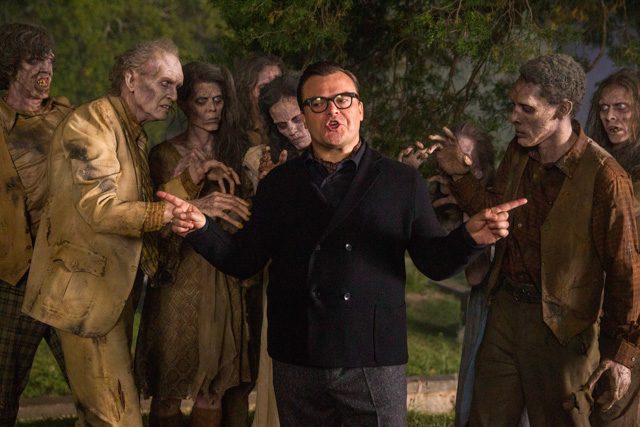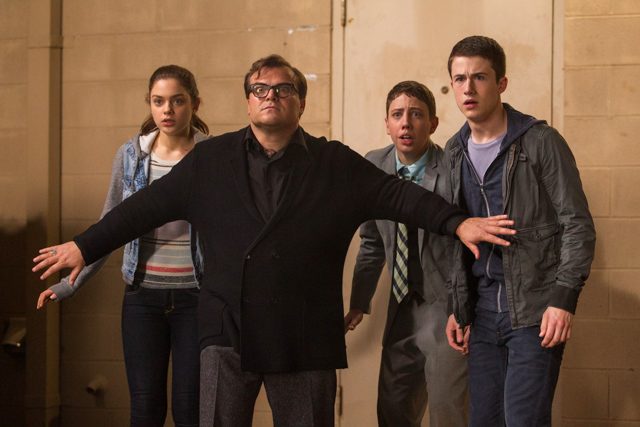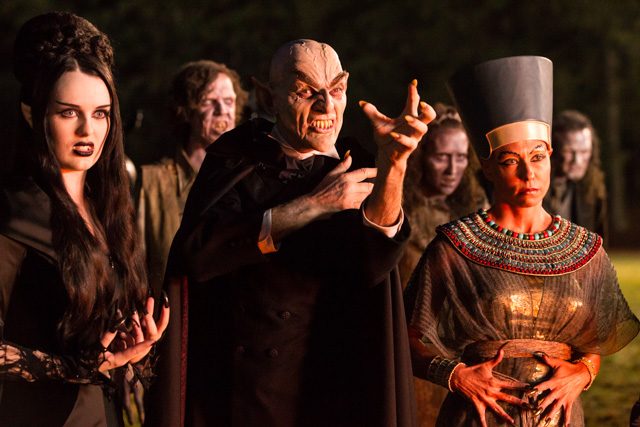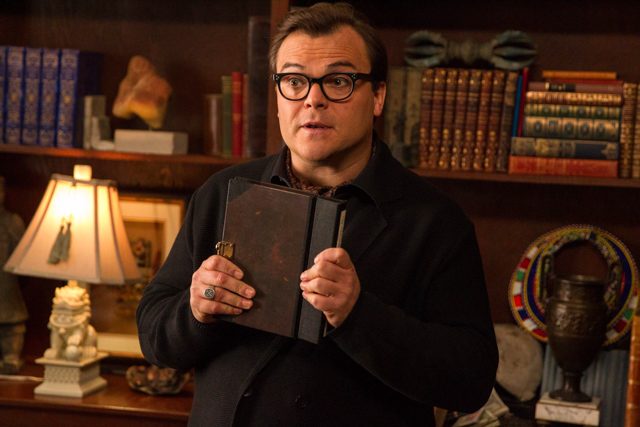SUMMARY
This is AI generated summarization, which may have errors. For context, always refer to the full article.

Believe it or not, Rob Letterman’s Goosebumps has a bit of a pedigree.
The story is credited to Scott Alexander and Larry Karaszewski, who have written Burton’s Ed Wood (1994) and Big Eyes (2014), and Milos Forman’s The People vs. Larry Flynt (1996) and Man on the Moon (1999).
The concept, which throws a fictional R.L. Stine in a world where the monsters he has created come to life to wreak havoc in a sleepy town, is quite witty, opening up a lot of opportunities for comedic jabs at Stine’s work without abandoning the sacred template that made his books such a hit in the first place.
The story was then turned into a screenplay by Darren Lamke, whose previous works include Mike Mitchell’s Shrek Forever After (2010), Bryan Singer’s Jack the Giant Slayer (2013), and David Soren’s Turbo (2013). Letterman got on board to direct the film, probably on the basis of his work in Monsters vs. Aliens, which craftily teamed up cartoon variants of Hollywood’s most infamous B-movie monsters in a generic tale about acceptance amidst diversity. (WATCH: Jack Black in first ‘Goosebumps’ movie trailer)
Formula to fly
So the Goosebumps movie we have now is essentially what remains of a good concept after being filtered by Hollywood’s market-driven demands. A lot of the wit is watered down by casting dull but pretty faces for roles that demand palpable quirks and blemishes to work.
It is an obvious compromise, given that the film is swimming alongside book-to-film adaptations whose chiseled and dashing heroes epitomize the kind of perfection teenagers aspire for.

Zach (Dylan Minnette), the film’s tediously personable protagonist, is a teenage New Yorker who begrudgingly relocates to a small town to cure his heartaches by predictable encounters. Unsurprisingly, his timely relocation paves the way for him to meet a host of characters, including grumpy Mr. Stine (Jack Black), his chirpy but gorgeous daughter Hannah (Odeya Rush), and Champ (Ryan Lee), the friendless geek who becomes the film’s token nod to pubescent awkwardness given that everybody else has been infected by the Twilight bug.
The small town’s stereotypically populated with kids who are as curious as they are sarcastic and adults whose only role in life are to bumble around and embarrass the kids. It is the apt and convenient setting to have Zach and his friends reverse their fortune, turning themselves from zeroes to heroes, and learn a thing or two about life in the process.
In other words, Goosebumps is as typical as it gets, which is perfect for a film whose very source of inspiration are novels that rely on formula to fly.
Carnival ride

Goosebumps has all the makings of a bland kid’s flick. Its goals are meager, telegraphed immediately as soon as Zach reflects on the repressed grief for his deceased father. Yet the scope of its emotions are not profound. It is mostly silly, save for certain parts wherein it proposes growth and maturity for its major characters. Even there, the film never really grounds itself on connecting with its audience via its characters’ varying transformations.
Take away the generic drama and romance, it’s all a carnival ride. What sets the film apart and what saves it from the utter blandness of studio-imposed conventionality is its insistence to be a cheekily irreverent homage to Stine rather than a straightforward adaptation of one of the prolific writer’s famous works.

Black enjoyably overplays the fictional Stine. He starts off obnoxious, the cliched mysterious neighbor who welcomes newcomers with acidic growls and ominous warnings. Black’s Stine is the biggest and most effective joke in the film, considering that his persona reflects on an author whose reputation is primarily based on a repetitive series of novels that can never be taken seriously.
Ingenious self-deprecation

However, nobody can deny the books’ popularity. Their clever mix of humor and horror has resonated loudly, or at least loud enough to create a lasting dent on pop culture.
The easiest thing to do is to simply tread the path of convenience by simply pandering to the books’ tactic of blending laughs with derivative scares. Letterman however stuck with Alexander and Karaszewski’s concept, opening up the franchise to ingenious self-deprecation, which haughtily culminates in an ending that suggests that even the best of Stine’s precious works could have been written by a kid. – Rappler.com
 Francis Joseph Cruz litigates for a living and writes about cinema for fun. Thefirst Filipino movie he saw in the theaters was Carlo J. Caparas’ ‘Tirad Pass.’ Since then, he’s been on a mission to find better memories with Philippine cinema. Profile photo by Fatcat Studios
Francis Joseph Cruz litigates for a living and writes about cinema for fun. Thefirst Filipino movie he saw in the theaters was Carlo J. Caparas’ ‘Tirad Pass.’ Since then, he’s been on a mission to find better memories with Philippine cinema. Profile photo by Fatcat Studios
Add a comment
How does this make you feel?
There are no comments yet. Add your comment to start the conversation.